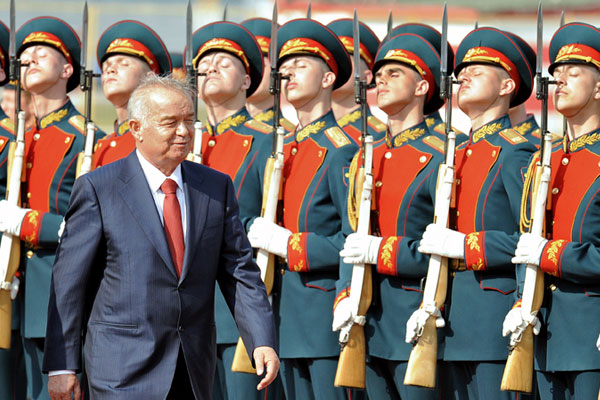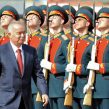
Twists and Turns of Uzbekistan’s Foreign Policy
Publication: Eurasia Daily Monitor Volume: 9 Issue: 156
By:

Stability is cherished by the regime in Uzbekistan, but it does not mean changing foreign policy views is out of line. Such is the outlook in Tashkent where, on July 31, the lower house of parliament approved President Islam Karimov’s proposal for a new foreign policy concept, which shuns the country’s membership in military and political alliances, bans foreign bases on its territory and opposes imposed integration (see EDM, August 10; www.cursorinfo.co.il, www.inosmi.ru, August 6).
In the language of Eastern, or rather Central Asian, diplomatic finesse, the bill rejects the country’s participation in military and political blocks but states that Uzbekistan “reserves the right to make alliances, to enter the communities and other inter-state organizations and withdraw from them, guided by the best interests of the state…” (lex.uz)
The bill is yet to be reviewed by the Senate on August 30-31 and then signed by the President, but that likely is a formality. Uzbekistan has reasons to pursue the bill and quite a track record of independent will when dealing with Russian- and US-led security engagements in Central Asia.
This past June, Uzbekistan pulled out of the Moscow-led Collective Security Treaty Organization (CSTO), just six years after it re-joined the body following Western criticism of the massacre in Andijan where authorities killed a large number of protesters. The Western condemnation had prompted Tashkent to evict the United States from its base at Karshi-Khanabad, causing a rupture in US-Uzbekistani relations, which began to improve with the establishment of the Northern Distribution Network (NDN) running supplies to NATO forces fighting in Afghanistan. Uzbekistan first quit the CSTO in 1999, seven years after its founding in Tashkent. If history is any guide, Uzbekistan may again return to the CSTO in six or seven years, perhaps as a way to balance against China.
“I think that the exit of Uzbekistan from the [CSTO] will, of course, have a negative character because Uzbekistan will not participate in collective efforts aimed at stabilizing the situation in Central Asia. This situation is complex and relates, first and foremost, to what happens in Afghanistan,” CSTO Secretary General Nikolai Bordyuzha said on August 1 (www.zakon.kz, August 1). Where those collective efforts were during the 2010 clashes between Kyrgyz and Uzbeks in Kyrgyzstan is still debated, but analysts have already noted the body’s failures to intervene. Part of the reason for the alleged failure is a wide distrust of alliance members toward each other and especially Russia, which has relied on the CSTO to further its influence in Central Asia (see EDM, September 16, 2010).
Russia operates an airbase in the northern city of Kant in Kyrgyzstan and has sought to establish a CSTO base in the country’s south close to the Uzbekistan-Kyrgyzstan border – a move Tashkent, as well as Beijing, opposes staunchly. When Uzbekistan was a CSTO member, it declined to join its Collective Rapid Reaction Forces and also voiced its opposition to the group’s decision to institute a veto over deployment of foreign forces on the territory of a member state. Tashkent’s fear of Russia’s alleged imperial advances is as deep-seated as is Moscow’s imperial nostalgia, among some elite, for hegemony over the former colonies. Recently, Russia has stepped up efforts to promote its influence in Eurasia, most notably with the launch of the fully functioning Customs Union comprising Belarus, Kazakhstan and Russia, as well as the Eurasian Union initiative, in part designed to block China’s advance in the broader region. The bill on Tashkent’s proposed foreign policy concept puts it bluntly: “no integration can be pushed on Uzbekistan externally” (www.uzdaily.uz, August 1).
The new foreign policy concept sends a strong message that, as a sovereignty entity, Uzbekistan is free to pursue any forms of cooperation with anybody. And if putting this on paper complements the purpose, all the better. Uzbekistan has consistently and boldly aspired to demonstrate that it would not serve Russia’s will, or that of any other powers. The bill, therefore, is as much a message to Washington and Beijing as it is to Moscow, though the latter is sure to take it closer to heart given its historical involvement in the region, now encircled by four nuclear-armed states.
As it distances itself from possibly burdening commitments with great powers, Tashkent seeks to rely on Washington, Moscow and Beijing just enough not to fall within their orbits. As it does so, it seeks to ensure the regime’s survival and regional security after NATO forces leave Afghanistan. This thinking likely resonates in Washington, despite all the talk about US withdrawal from the Central Asian “backwater.” Indeed, at this stage, the United States looks to Uzbekistan as a key transit point in the NDN to move supplies in and out of Afghanistan as it pulls out of the Afghan war theater. In the longer term, however, it may be looking to Uzbekistan to provide basing opportunities in light of the possible closure of the Manas air base in Kyrgyzstan around 2014 and the need to maintain a long-term military presence in the region. The same may be the case with Tajikistan, though authorities there deny having any talks with Washington regarding a potential US military base. Recently, Tajikistan and Russia have reportedly come close to approving a deal for another 49-year extension of Russia’s military base in the country, despite prolonged talks (www.rt.com, July 17).
The question is whether Uzbekistan wants to serve the role of a US military outpost. The rivalries between Washington and Moscow over basing rights in Kyrgyzstan and the government overthrow in the country in 2010 provide a strong reason for the Uzbekistani regime to avoid potentially dangerous military commitments with external actors. Russia’s military presence in neighboring Kyrgyzstan and Tajikistan is also a reminder to Tashkent not to antagonize Russia too much by pursuing far-reaching military engagements with Moscow’s geopolitical rivals in Eurasia. The bill’s reference to non-participation in military alliances – its anti-Russian proclivities notwithstanding – is therefore designed to also assure Kremlin that Uzbekistan is not up for grabs.
This does not, of course, suggest that Tashkent will necessarily ignore the NDN or other offers of collaboration. This August, the United States and Uzbekistan will hold their Annual Bilateral Consultations, the outcome of which will shed more light on the evolution of Uzbekistani-US relations. According to the press release of the US Department of State, “the sides will work […] to make progress in creating the necessary business atmosphere to increase US companies’ investments in the economy, educational and cultural exchange, to resolve the current problems in the field of human rights and to strengthen security and cooperation in defense” (www.state.gov, July 24; www.en.trend.az, July 26). The timing of the consultations, Uzbekistan’s decision to pull-out of the CSTO, and the ban on military bases as part of the national security strategy bill suggests that Tashkent may be bargaining to get the most out of the talks with Washington, which relies heavily on Tashkent’s role in the NDN.
Short of declaring neutrality, the proposed foreign policy concept seeks to ensure that Uzbekistan is not constrained by external actors but that it can adapt to changing circumstances. It views this ability as critical in the region, which is experiencing a strong integration push by Russia, a growing influence of India and China, as well as uncertainty regarding future US military involvement. The bill also looks to secure the regime of President Karimov, whose age opens the question of leadership succession. Finally, it helps authorities to seek order from within while shunning the one without.




